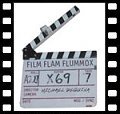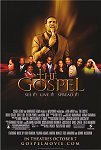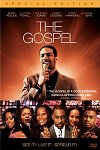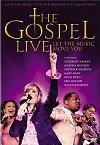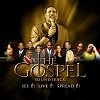 ; Rated PG ; Rated PG
BUY THE:
 MOVIE POSTER! MOVIE POSTER!
DVD!
VHS!
LIVE DVD!
MOTION PICTURE SOUNDTRACK CD!
With a title like The Gospel, it would be easy to peg Rob Hardy's faith-themed drama to be a piece of exclusionary, preach-to-the-converted propaganda. But the writer-director manages to achieve the tricky feat of creating a film that respectfully represents its milieu while effectively delivering a resonant message that is as uplifting as it is universal.
The basis of the film is recognizably, specifically Bible-based, however, as it is a variation on the story of the prodigal son. Here it is David Taylor (Boris Kodjoe), a successful R&B singer who returns to home to Atlanta when he learns of his estranged bishop father's (Clifton Powell) ailing health. The Bishop's condition also happens to reflect the sad state of his beloved church, for which David's childhood friend Charles Frank (Idris Elba), now a reverend and heir apparent to the Bishop, has grand recovery plans. David's plans of a smooth homecoming, though, are quickly quashed when he's not exactly welcomed with open arms but rather raised-eyebrow whispers and condescension; his celebrity status matters little even to a simple young woman like Rain (Tamyra Gray), the single mom choir singer in whom David takes an interest.
Oddly enough, while David's thread is the one that is overtly scripture-inspired, it is also the least interesting and involving, partly because of the rote familiarity of it, but also due to the casting of Kodjoe. While the erstwhile ensemble member of Showtime's Soul Food admirably takes on a stretch for his first big league big screen lead, he never really rises above the merely adequate at best. He never quite owns the character's musical numbers, whether the opening R&B number or his centerpiece gospel performance; while the lipsynching task (David's singing vocals are provided by Greg Kirkland) does put Kodjoe at a disadvantage from the get-go, he doesn't put forth the necessary effort to make the illusion of David's "singing" convincing. Ironically, in other areas his performance too visibly shows his strain, coming off as uneasy and a bit of a dramatic lightweight in the presence of his more formidable co-stars, whether the likes of seasoned veterans such as the terrific Powell and Aloma Wright (especially noteworthy as church secretary Ernestine) or the effortlessly commanding Elba and Nona Gaye (as David's cousin and Charles's wife Charlene).
Luckily there are those other actors and storylines to carry the film when interest in David and his plight flags. In fact, Hardy could have easily made the film about Elba and Gaye's characters, and it probably would have been better for it. Both Charles and Charlene go through their own individual spiritual journeys--Charles in reconciling the ego boost of his "mega-church" ambitions with their selfless intent; Charlene in coming to grips with her buried feelings of inadequacy--that lead to epiphanies in a far less predictable and hence far more involving manner than the prodigal son track, but even more engrossing is the story of their strained relationship. While the reasons for their marital troubles are never explicitly stated until the end, Elba and Gaye are remarkably eloquent and captivating in their silence and stillness, reaching levels of nuanced emotional complexity not present anywhere else in their film. When their subtle anguish finally reaches a climactic eruption, the searing scene just underscores just how much more powerful the film and impactful its faith-affirming message could have been had the film centered around them.
Even so, in its existing, simpler state The Gospel effectively conveys that message without bludgeoning a specific belief structure into its audience. Hardy approaches the film as though it just so happens that this particular story takes place within the Southern Black Christian church, no more, no less; the underlying theme about recovering one's sense of identity, home, and faith--in whatever that may be--comes across in a relatable way regardless of one's denomination. Helping immeasurably is the buoyant music; the soundtrack features a number of rousing original tunes by Kirk Franklin and stirring performances by Gray as well as a number of gospel stars appearing in cameos, such as Fred Hammond (who executive produced), Yolanda Adams and Martha Munizzi. But beyond the music itself, these energetic sequences are effective because they ring so true; unlike the glossy Hollywood movie musical number treatment in films such as The Fighting Temptations or even the climax of Diary of a Mad Black Woman, The Gospel's performance scenes feel genuine, playing as if directly culled from an actual Sunday service. In focusing his camera on those singing and clapping in the pews as much as those doing so in the choir, Hardy creates a palpable, welcoming sense of community; the musical moments here are not about highlighting singers' voices but how these voices can bring people together despite their differences and flaws and then create and share in a greater sense of uplift.
The Gospel works in a similar way; despite some unevenness and technical turbulence along the way, everything assembles into an appealing and entertaining package that makes up for whatever it lacks in perfectly polished sheen in exuberance and passion for its subject and message. From top to bottom those involved in the project obviously believe, and by the time the last note rings out, one may be surprised as to how much one has come to believe as well.
(written September 30, 2005)
BUY THE:
 MOVIE POSTER! MOVIE POSTER!
DVD!
VHS!
LIVE DVD!
MOTION PICTURE SOUNDTRACK CD!

Press Junket Roundtable Transcripts
The World Premiere
The Soundtrack
Home
External links:
The Gospel: The Official Site
Rainforest Films
Verity Records
NonaNet
House of Tamyra
Boris Kodjoe Official Site
The Gospel @ The Internet Movie Database
The Gospel Movie Review/© Michael Dequina
All images and multimedia files are copyright their respective copyright holders and no rights are given or implied

|
